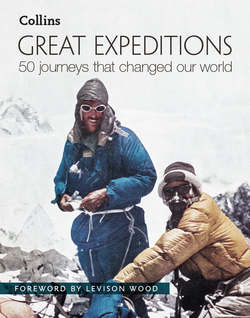Читать книгу Great Expeditions: 50 Journeys that changed our world - Levison Wood - Страница 6
ОглавлениеForeword
With the advance of modern technology our world seems smaller. We have apps that can translate a phrase at the touch of a button, travel is more affordable and new places can be discovered by swiping a screen. Yet there is still so much to be discovered. What has not changed since early explorers set out with little more than a map is the spirit required to undertake an expedition; the love of a challenge and the mental and physical toughness a person needs to call on when things may not be going their way. Exploration is about more than putting a flag in a map. It’s about the experiences that change us and the people we meet along the way.
I have found over the years that the best way to travel and explore is on foot. There’s nothing like treading the paths and tracks to get a real impression of a country, its landscape and its culture. The many explorers who went before me didn’t have helicopters on hand or gadgetry to make their lives easier. Whether they were trekking the banks of the Nile or scaling peaks in the Himalayas; breaking new trails in the jungles of Asia or crossing unknown deserts, it was these early pioneers who inspired me.
David Livingstone’s journey to find the source of the Nile was a large part of the motivation behind my own nine-month expedition walking the length of the world’s longest river. It was reading about these adventures as a young man that set me on my path, starting in the army and eventually undertaking world-first expeditions of my own. Like Livingstone, I was also documenting my journey, keeping scribbles in a notebook rather similar to the one he used. But then again, I was able to use technology such as cameras he could only have dreamt of. We were both creating our own records of a shared experience more than 150 years apart.
As I have learned, modern day expeditions are not immune to danger. Whilst the promise of a helicopter can give the impression of a safety net, there is still a huge risk for anyone undertaking a remote climb or trek. Nature, whether it’s driving winds, freezing temperatures or intense heat, poses just as much risk today as it did a hundred years ago. The results can be tragic, as anyone who followed Walking the Nile will know. For early explorers such as Amundsen, Shackleton and Nansen, the Poles proved the ultimate challenge. Things inevitably go wrong but it’s at these times that a person can show what they’re made of. This book is a celebration of the few brave people who defied terrible odds and conditions to prove something vital to both the world and themselves. For every risk, the rewards are huge.
The stories featured in this book form an extensive list of human achievement that has had a huge impact on the world today. No space mission has quite captured the imagination of the world like the Apollo 11 moon-landing or had such a profound impact on science as Charles Darwin’s voyages. Sometimes these stories, such as the Challenger journey to the deepest point on Earth, are so extraordinary they can seem like science fiction. Personally, the expeditions that I love are the long-distance overland journeys, such as those by the intrepid Frenchwoman Alexandra David-Néel who in 1924 crossed the Himalayas in midwinter and entered a forbidden Tibet in native disguise. Perhaps less well known, but an achievement that deserves to be recognised.
There is still much to explore and plenty of experiences to be had, and I am sure that within our lifetime we will see more Great Expeditions that are just as impressive as the ones detailed in this book. I for one hope to keep following in the footsteps of the explorers who have gone before.
LEVISON WOOD
